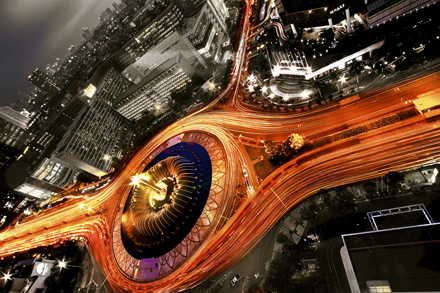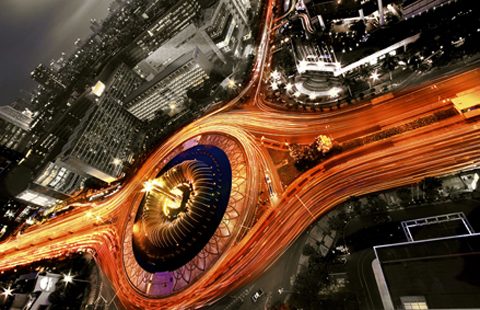
Can Jokowi keep brightening Indonesia’s economic prospects? Photo of Jakarta’s National Monument by Ignatius Win Tanuwidjaja on flickr
Indonesia’s leadership transition is completed this month, after an election that reinforced its democratic system. But economists say its pathway to greater prosperity is not so certain. Hamish McDonald reports.
When Joko Widodo, the carpenter’s son from the small city of Solo, is sworn in as Indonesia’s seventh president this month, it will complete a fraught transfer of power that in the eyes of many political experts came close to reversing the country’s democratic trajectory.
The ANU College of Asia and the Pacific’s Edward Aspinall for one saw this year’s elections, in April for the Indonesian parliament or DPR and in July for the presidency, as the most significant since the country threw off the former authoritarian rule of the late president Suharto in 1998.
With Widodo’s humble brand of populism facing a demagogic challenge from the ultra-nationalist former army general Prabowo Subianto, and “the most flagrant expression of money politics” ever seen, especially in the parliamentary election, Aspinall thinks Indonesia experienced a “near miss” threat to its democracy.
Many political uncertainties face Widodo, known widely by his nickname “Jokowi”. As speakers at last month’s annual ANU Indonesia Update conference pointed out, the list reads like a litany of woe.
It includes rising religious intolerance, a powerful DPR in which parties supporting Jokowi are not yet in the majority, moves to wind back direct elections of regional chiefs, an incomplete military retreat from political influence, and unrest in Papua.
But the biggest problem is how to keep the Indonesian economy growing at the six per cent a year rate enjoyed for much of the last decade in a beneficial global economy, with outgoing president Susilo Bambang Yudhoyono (known as SBY) taking the credit.
“While Indonesia’s democracy is safe, Indonesia’s prosperity is not,” said Douglas Ramage, a Jakarta representative of Bower Group Asia, an American political-economic consultancy on the region.
Like Australia, Indonesia is coming down from the peaks of the commodity boom fired up by the once-racing Chinese and Indian economies and has to adjust, says Hal Hill, an economics professor at the ANU Crawford School of Public Policy with a career-long focus on Indonesia and other Southeast Asian countries.
“Indonesia is at a cross-road,” Hill says.
It urgently needs a new growth strategy to replace the once surging export earnings from coal and other minerals, and from palm oil and other plantation crops whose spread is causing environmental risks.
With subsidies for (increasingly imported) fuel and electricity chewing up a quarter of government revenue and continuing high administrative costs, “Indonesia has zero fiscal space without reform,” Hill said. It has done it before, in the mid-1980s when low oil export prices encouraged a shift into labour-intensive manufacturing, but that was when economic technocrats had the backing of an autocratic regime.
Now the question is whether Indonesia’s unruly politics can deliver a comparable shift.
Unfortunately, this year has just seen “a more or less complete disconnect between economic realities and the 2014 election campaigns,” Hill said.
“During the election campaign the worst type of policies came to the fore,” adds Ramage.
Economic myths became the election staple: that Indonesia relied too much on imports and foreign direct investment; that the state sector needs to be expanded; that free trade disadvantages Indonesia.
In particular, both the Jokowi and Prabowo camps pushed the line that Indonesia needed not just food security, but food self-sufficiency.
With the 10-nation Association of Southeast Asian Nations, of which Indonesia is by far the largest member, about to launch its economic community at the end of 2015, both camps expressed wariness about the free-trade implications. In one debate, Widodo even suggested the bureaucracy should tilt the playing field against foreign companies. “There is no doubt neighbours in ASEAN are deeply worried about this,” Ramage said.
On foreign investment in natural resources, Jokowi has stated a position that while existing contracts will not be abrogated, when they expire the resource should revert to Indonesian control and the state sector should get the first option to take over exploitation.
“You’d have to go back a long time in Indonesia to find examples of anti-foreign economic sentiment being expressed publicly like this,” Ramage said.
Is this just election rhetoric, as many hope? “No, not at all,” Ramage said. “It expresses the biggest urban myth of Indonesia this year. It is simply the full-throated public expression of sentiments and policies already endorsed widely in the bureaucracy and the policy elite.”
Ramage noted however that it was “hopeful and positive” that the new presidential team comes from a genuinely entrepreneurial background rather than “rent-seeking”: Jokowi having founded a successful business manufacturing furniture for export and vice-president-elect Jusuf Kalla having expanded his family trading business into a largish conglomerate.
But like Hill and other speakers, Ramage worries that Indonesia could fail to make the next economic leap.
“If Indonesia under Jokowi continues SBY’s policy of steadily restricting investment, shunning FDI, remaining deeply sceptical of the benefits of free trade to reduce poverty, hostile to the private sector, then Indonesia in five years’ time – given Jokowi’s very admirable focus on health, education and infrastructure – could find itself a little healthier, a bit better educated, with mildly improved infrastructure, but well and truly stuck in the lower middle income trap.”
Hamish McDonald is Journalist-in-Residence at the Australian National University’s College of Asia and the Pacific.
Watch full presentations from the 2014 Indonesia Update at http://bit.ly/2014IndoUpdatevideos
 Facebook
Facebook  Twitter
Twitter  Soundcloud
Soundcloud  Youtube
Youtube  Rss
Rss 